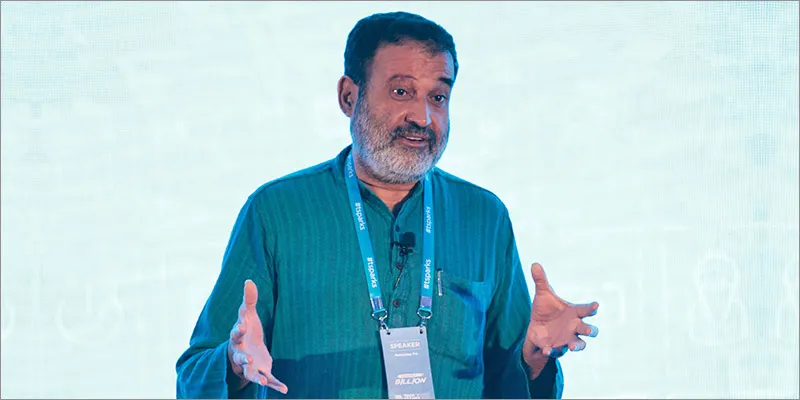Mohandas Pai on Budget 2018: Improve processes and productivity, focus on agriculture
IT veteran and tech investor Mohandas Pai gives his take on what the Budget should look like when it comes to agriculture, manufacturing, education, and infrastructure spending.
Mohandas Pai, Chairman of Aarin Capital and the ex-Chief Financial Officer of Infosys, and current Chairman of Manipal Global Education Services, has been very vocal on boosting the economy’s productivity.
He has invested in over 50 startups, and believes that several issues in India can be solved with the right policies and by creating an environment that helps entrepreneurs flourish. He also believes that India is perhaps the only country that pays people, through subsidies, to remain poor.
Ahead of the Union Budget, YourStory spoke to Mohandas Pai on his thoughts about the Budget and what one can expect:

YS: I see a lot of interest in agriculture from your side, and you are betting on startups. What are your thoughts?
Mohandas Pai: The big issue is to improve productivity, improve processes, connect to markets, and get a better price. Drip irrigation, completion of irrigation projects, shallow wells in eastern India, and rejuvenation of tanks by desilting should be invested in massively.
We need better quality seeds and training for farmers through agri-extension workers, who work with agritech startups to improve process and yield. We must use Aadhaar for farmers to access fertilisers. The Green Revolution in the seventies succeeded because of training and better seeds.
We need bigger investment in animal husbandry, especially goat rearing, to improve incomes. The National Agricultural Market must connect farmers to markets; this should be accelerated. We need a scheme to compensate farmers for the shortfall in receipt of MSP, as in Madhya Pradesh.
There’s also a need to connect big retail with farmers to improve income and to ensure completion of rural roads network so all villages are connected to markets. Further, all social schemes for health insurance, income support, and pension should reach every family. All farmers’ houses should get power connections. The crop insurance scheme for dry-land farming, which is 52 percent of farming, should be improved as the distress is more here.
The Telangana model of giving subsidy of Rs 4,000 per acre of dry land is worth considering in dry areas to give relief. The budget should focus on agriculture and farmers rather than on new projects. We need to reduce rural distress and complete all ongoing projects so that benefits reach farmers urgently.
YS: Do you think we are finally going to do something in manufacturing?
MP: The issue in manufacturing is supply chain costs. Faster movement through ports and abolition of check posts could reduce costs. Excess costs of formal employment should be reduced through reduction of fees for ESI and EPF. Cross-subsidy by industry for power should be abolished to ensure the cost of power comes down. If the government wants to give subsidised power, it should be through the budget, not from industry. Corporate Tax rate should be reduced to 25 percent to reduce costs, and increase internal resources.
We need a special scheme to give equity support through a Rs 50,000 crore Fund of Funds to MSME linked to loans taken for expansion from banks equal to 10 percent of investment in expansion. We also need quick action against dumping by China to increase growth.
YS: What of education? What must we do to boost this sector because we also have to create jobs?
MP: The top 200 universities should be given full autonomy - academic, financial, and administrative. The top 10,000 colleges, those that get 10 percent more students to pass in exams than the university average should be given full autonomy and freedom to expand their own infrastructure and curriculum.
We need a National Scholarship Scheme so that any young citizen whose parental income is less than Rs 5 lakh per year is given a scholarship to study in a college of their choice. We need a National Research Foundation for science, technology and humanities to be set up to give grants on a competitive basis with an annual grant of Rs 5,000 crore to improve research.
For schools, those in the top 25 percent should have full freedom to expand so that more children get good education. In 250 poor districts, the government should set up residential schools like Kendriya Vidyalaya to improve education. We need school boards in districts to improve quality.
YS: They say this year is one for infrastructure spending. What do you think?
MP: We need to complete all road and railway projects to get benefits of faster growth. Improving speed of railways and reducing costs is necessary. We must kickstart expansion of congested airports across India. There should be electric power for all, so we need to complete ongoing power transmission projects, increase solar and wind power. We must create online processes for smooth movement of goods across India to reduce costs. Let us kick-start full electrification of railways and expand waterways across rivers.
YS: How do we boost consumer confidence in spending?
MP: We must keep inflation in check by sticking to fiscal consolidation. We must reduce GST for all goods barring 10/15 in the 28 percent bracket. We should also reduce costs of formal employment. These are things that will boost spending. Also, increasing the tax slab to Rs 3,00,000 from Rs 2,50,000 will boost spending.







